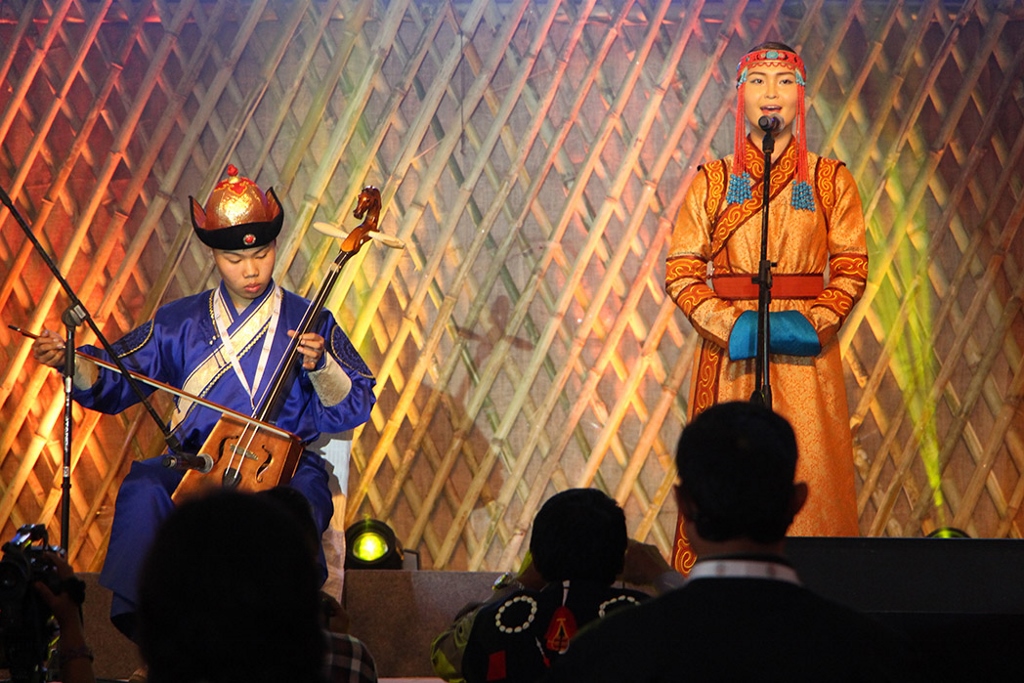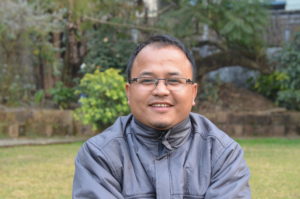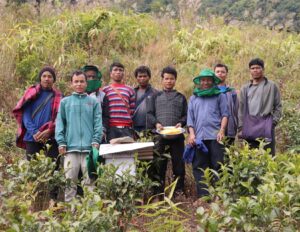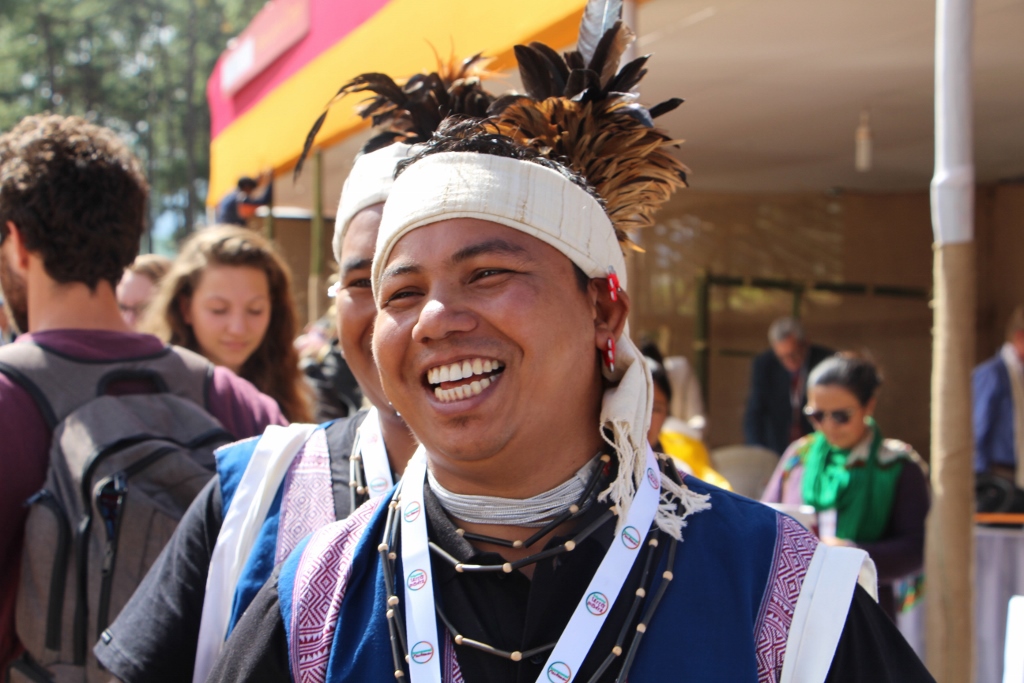
The first day of the Indigenous Terra Madre 2015(ITM), Shillong kicked off today at the Convocation Hall of the North Eastern Hill University (NEHU). The inauguration ceremony saw the coming together of 640 delegates belonging to 140 communities that have gathered here for the 5-day event. The attendance was in their traditional fine attire adding to the colourful mileu of the event that has representatives from 58 countries .
After the formalities of registration were dealt with, the delegates were welcomed into the venue by the playing of traditional drums. Once indoors, the ceremony officially began with Mr. Phrang Roy, (Chairman – NESFAS & Coordinator – The Indigenous Partnership) welcoming all those gathered and sharing the message of ITM with all. He said, “We are here to learn from each other, to collectively interpret the future we want”. This was followed by the Hima (Chief) Khyrm’s welcome speech, who is the traditional Khasi community elder, where he invited the blessings of the land for the festival and the crops. He then invited representatives from all seven continents onto the stage and honoured them, along with Mr. Roy. The next highlight was a video message from His Royal Highness Prince Charles, Prince of Wales. Stating how necessary it is to change the current global food situation, he urged that we look to “indigenous wisdom” and “develop an approach that acts globally, but thinks locally”.
Mr. Roy then invited on stage Mr. Krishna Srivastava, the Vice Chancellor of NEHU who welcomed the delegates not only to the venue, but to Shillong and India as well. This was followed by the Keynote Address by American activist from the Anishinaabe tribe, Winona La Duke, who stressed on preserving food-based traditions and looking towards indigenous people to share their knowledge, reiterating that food is sacred, it is part of who we are genetically and spiritually. She recounted how the seeds of squash, lasting 800 years, were discovered in an archaeological dig and are now being cultivated by her community. She especially asserted the effects of big corporations and climate change on traditional ways of life and urged all to “live in peace but to fight pipelines that affect our wild rice”.
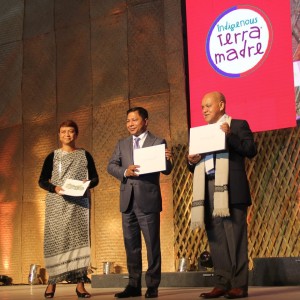 The cultural aspect of the afternoon began with a live vocal and instrumental performance of the ITM theme song “Ko Mei-Ramew”, after an introduction to the song by Mr. Phrang Roy, which was well-received by the audience. Next, was the unveiling of the coffee table book ‘Meghalaya: Sifting Through the Clouds’ by the Chief Minister Dr. Sangma and Mr. Roy. The CM then took the stage to share the continued association of the Government of Meghalaya with the ITM since its conception and to congratulate the team on the efforts made to bring it to fruition. He also stressed on the importance of making living rural areas remunerative and this would only be if “indigenous people conserved their traditions and ways of life”.
The cultural aspect of the afternoon began with a live vocal and instrumental performance of the ITM theme song “Ko Mei-Ramew”, after an introduction to the song by Mr. Phrang Roy, which was well-received by the audience. Next, was the unveiling of the coffee table book ‘Meghalaya: Sifting Through the Clouds’ by the Chief Minister Dr. Sangma and Mr. Roy. The CM then took the stage to share the continued association of the Government of Meghalaya with the ITM since its conception and to congratulate the team on the efforts made to bring it to fruition. He also stressed on the importance of making living rural areas remunerative and this would only be if “indigenous people conserved their traditions and ways of life”.
The next session was the airing of a video message by MS Swaminathan, leading Indian geneticist, who talked about the development and conservation of agro-biodiversity. He supported the claim that “indigenous people should be rewarded for their contributions”. Following this was a stellar dance performance from various tribes Meghalaya with more than a hundred people coming on the stage.
NESFAS, one of the organizers, was represented by Pius Ranee, Associate who said through his work he has understood “it is difficult to learn others’ knowledge when we have to forget our own” and asked for the government and schools to encourage indigenous knowledge for a better future. The Bethany Society singers took the stage after Ranee, with one of the visually impaired singers eloquently reading delicately with her fingers from her Braille script that “human diversity must be a value for the future we want” and arguing for a world that valued the full spectrum of humanity. Thereafter, Eli Enns, an indigenous research fellow from Canada, voiced his concerns while sharing a saying from his people – “Everything is one and everything is interconnected.”
One of the last speakers, but definitely one of the most-awaited ones, was Carlo Petrini, founder of Slow Food International. Petrini made an impassioned case for “every government to take decisions”. He lamented that “food has lost its value, becoming just a commodity; we are losing our histories and food heritage. Only a return to local economies will change the paradigm of the current food systems,”. He also argued that we must not only talk but act. The last speaker, Jose Andreas, an indigenous chef from North America, brought the message home simply – “we must stop throwing money at the problem… we must begin to listen to the experts- the indigenous people”.
Finally the event wound up with a performance by the world-famous Shillong Chamber Choir accompanied by renowned dancer Astad Deboo, which was enthusiastically received by the whole audience. Proving that music truly transcends boundaries of language, backgrounds and culture, the grand finale was a fitting conclusion of the first day of this event that hopes to do the same. In the next 4 days, there will be a 2-day closed door conference, taste workshops, and also ITM on Campus for the citizens of Shillong.